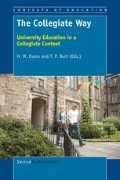Abstract
This chapter outlines different views of what it means to be a graduate and argues that, in the most sophisticated of these views, colleges might play a key facilitating role in developing the core of that ‘graduateness.’ It outlines an early, but highly influential theory which gives an account of that development, discusses how the ‘collegiate way’ described in this book might promote epistemological growth – growth in understanding the nature and complexity of knowledge and knowing – and concludes by raising concerns about miscommunication regarding colleges which can arise when different stakeholders hold quite different views of the role of a university in preparing graduates.
Access this chapter
Tax calculation will be finalised at checkout
Purchases are for personal use only
Preview
Unable to display preview. Download preview PDF.
References
Baxter Magolda, M. (1992). Co-curricular influences on college students’ intellectual development. Journal of College Student Development, 33(3), 203–213.
Belenky, M. F., Clinchy, B. M., Goldberger, N. R., & Tarule, J. M. (1986). Women’s ways of knowing: The development of self, voice and mind. New York, NY: Basic Books.
Bendixen, L. D., & Rule, D. C. (2004). An integrative approach to personal epistemology: A guiding model. Educational Psychologist, 39(1), 69–80.
Green, W., Hammer, S., & Star, C. (2009). Facing up to the challenge: Why is it so hard to develop graduate attributes? Higher Education Research & Development, 28(1), 17–29.
Higher Education Council. (1992). Achieving quality. Canberra: Australian Government Printing Service.
Hofer, B. K., & Pintrich, P. R. (1997). The development of epistemological theories: Beliefs about knowledge and knowing and their relation to learning. Review of Educational Research, 67(1), 88–140.
King, P. M., & Kitchener, K. S. (1994). Reflective judgement concepts of justification and their relationship to age and education. Journal of Applied Developmental Psychology, 2, 89–116.
Knight, P., & Yorke, M. (2003). Learning, curriculum and employability in higher education. London: Routledge.
Kuh, G. D. (1993). In their own words: what students learn outside the classroom. American Educational Research Journal, 30(2), 277–304.
Olssen, M., & Peters, M. A. (2005). Neoliberalism, higher education and the knowledge economy: From the free market to knowledge capitalism. Journal of Education Policy, 20(3), 313–345.
Perry, W.G. (1970). Forms of Intellectual and Ethical Development in the College Years – a Scheme. New York: Holt, Rinehart & Winston.
Perry, W. G. (1985). Different worlds in the same classroom. In P. Ramsden (Ed.), Improving learning: New perspectives. London: Kogan Page.
Perry, W. G. (1997). Cognitive and ethical growth: The making of meaning. In K. D. Arnold & I. C. King (Eds.), College student development and academic life: Psychological, intellectual, social and moral issues. New York, NY: Garland.
Steur, J. M., Jansen, E. P. W. A., & Hofman, W. H. A. (2012). Graduateness: An empirical examination of the formative function of university education. Higher Education, 64(6), 861–874.
Woodall, T., Hiller, A., & Resnick, S. (2014). Making sense of higher education: Students as consumers and the value of the university experience. Studies in Higher Education, 39(1), 48–67.
Author information
Authors and Affiliations
Editor information
Editors and Affiliations
Rights and permissions
Copyright information
© 2016 Sense Publishers
About this chapter
Cite this chapter
Simpson, A. (2016). Colleges and the Development of Personal Epistemologies. In: Evans, H.M., Burt, T.P. (eds) The Collegiate Way. Contexts of Education. SensePublishers, Rotterdam. https://doi.org/10.1007/978-94-6300-681-1_13
Download citation
DOI: https://doi.org/10.1007/978-94-6300-681-1_13
Publisher Name: SensePublishers, Rotterdam
Online ISBN: 978-94-6300-681-1
eBook Packages: EducationEducation (R0)

